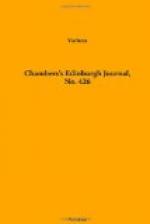At three o’clock in the afternoon (July 28), the prisoners were placed before the Revolutionary Tribunal, and at six, the whole were tied in carts, the dead body of Le Bas included, and conducted to execution. To this wretched band were added the whole family of the Duplays, with the exception of the mother; she having been strangled the previous night by female furies, who had broken into her house, and hung her to the iron rods of her bedstead. They were guiltless of any political crime; but their private connection with the principal object of proscription was considered to be sufficient for their condemnation. The circumstance of these individuals being involved in his fate, could not fail to aggravate the bitterness of Robespierre’s reflections. As the dismal cortege wended its way along the Rue St Honore, he was loaded with imprecations by women whose husbands he had destroyed, and the shouts of children, whom he had deprived of parents, were the last sounds heard by him on earth. Yet he betrayed not the slightest emotion—perhaps he only pitied the ignorance of his persecutors. In the midst of the feelings of a misunderstood and martyred man, his head dropped into the basket!
These few facts and observations respecting the career of Robespierre, enable us to form a tolerably correct estimate of his character. The man was a bigot. A perfect Republic was his faith, his religion. To integrity, perseverance, and extraordinary self-denial under temptation, he united only a sanguine temperament and moderate abilities for the working-out of a mistaken principle. Honest and zealous in his purpose, his conduct was precisely analogous to that of all religious persecutors—sparing no pain or bloodshed to accomplish what he believed to be a good end. Let us grant that he was a monomaniac, the question remains as to his general accountability. If he is to be acquitted on the score of insanity, who is to be judged? Not so are we to exempt great criminals from punishment and obloquy. Robespierre knew thoroughly what he was about; and far as he was misled in his motives, he must be held responsible for his actions. Before entering on the desperate enterprise of demolishing all existing institutions, with the hope of reconstructing the social fabric, it was his duty to be assured that his aims were practicable, and that he was himself authorised to think and act for the whole of mankind, or specially commissioned to kill and terrify into his doctrines. Instead of this, there is nothing to shew that he had formed any distinct scheme of a government to take the place of that which he had aided in destroying. All we learn is, that there hovered in his mind’s eye some vague Utopia, in which public affairs would go on very much of themselves, through the mere force of universal Benevolence, liberated from the bosom of Nature. For his folly and audacity in nourishing so wild a theory, and still more for the reckless butcheries by which he sought to bring it into operation, we must, on a review of his whole character, adhere to the popular belief on the subject. Acquitted, as he must necessarily be, of the charge of personal ambition, he was still a monster, only the more dangerous and detestable for justifying murder on the ground of principle.




